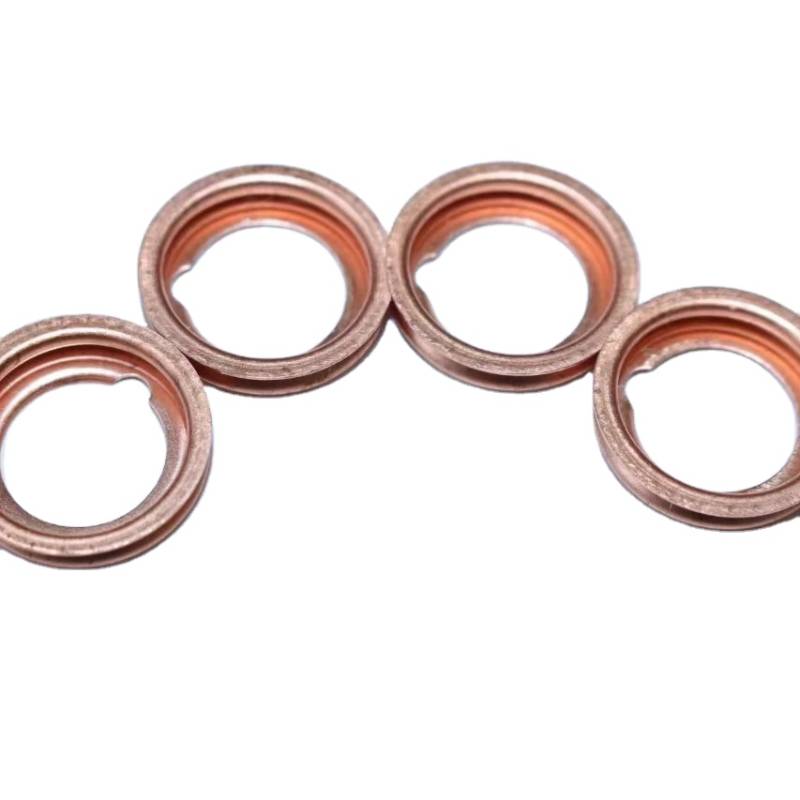metal oil seal
The Importance of Metal Oil Seals in Machinery
In the world of machinery and automotive engineering, oil seals play a crucial role in maintaining the integrity and performance of various systems. A metal oil seal, in particular, has become an essential component in numerous applications due to its durability and efficiency. This article explores the importance of metal oil seals, their construction, application, and advantages.
Understanding Metal Oil Seals
Metal oil seals, often referred to as metal-clad seals or metal-bonded seals, are designed to prevent the leakage of fluids in machinery. These seals typically consist of a rubber or elastomer inner surface combined with a metal outer surface. The metal component provides structural integrity and resistance against the harsh environments encountered in various applications. The combination of materials allows the seal to withstand extreme temperatures, pressures, and mechanical stresses.
Construction and Types
The construction of metal oil seals can vary based on the specific application requirements. Commonly, they feature a lip that creates a tight seal against a rotating shaft. This lip is made from resilient materials like nitrile or fluorocarbon, ensuring effective sealing.
There are two main types of metal oil seals rotary seals and stationary seals. Rotary seals are used in applications involving rotating shafts, like engines and gearboxes, while stationary seals are designed for fixed components. Depending on the design, metal oil seals can be single-lip or double-lip, with double-lip seals providing an additional layer of protection, further enhancing their effectiveness.
Applications of Metal Oil Seals
Metal oil seals are utilized in a broad spectrum of industries, including automotive, aerospace, manufacturing, and marine engineering. In automotive applications, they are critical in engines, transmissions, and differential assemblies, preventing oil leakage, which can lead to reduced efficiency and engine damage.
metal oil seal

In the aerospace sector, metal oil seals are crucial for hydraulic systems and fuel systems, where leaks can have serious consequences. Furthermore, in manufacturing environments, they are employed in various machinery to protect lubrication systems, ensuring smooth operation and reducing wear and tear on components.
Advantages of Metal Oil Seals
1. Durability Metal oil seals are designed to withstand harsh environments, including exposure to extreme temperatures, corrosive substances, and mechanical wear. Their robust structure ensures a long service life, reducing the need for frequent replacements.
2. Leak Prevention The primary purpose of metal oil seals is to prevent fluid leakage. This is crucial for maintaining the efficiency and safety of machinery. By preventing leaks, these seals help maintain optimal performance and reduce maintenance costs.
3. Versatility Due to their diverse designs and constructions, metal oil seals can be customized for various applications. This versatility allows manufacturers to tailor seals to specific needs, helping enhance overall system performance.
4. Enhanced Performance By providing effective sealing solutions, metal oil seals contribute to the overall efficiency of machinery. They help in maintaining pressure levels and preventing the ingress of contaminants, which can compromise system integrity.
Conclusion
In conclusion, metal oil seals are a vital component in modern machinery, ensuring optimal performance and longevity. Their robust construction and design enable them to operate effectively in harsh conditions, making them indispensable in various industries. Whether in an automotive engine or a sophisticated aerospace system, the role of metal oil seals cannot be overstated. By preventing leaks and protecting machinery from wear and tear, they play a crucial role in maintaining efficiency and reliability in today’s fast-paced industrial landscape. As technology continues to evolve, the development of metal oil seals will also advance, further enhancing their effectiveness and application in various fields.
-
Understanding the Front Main Engine Seal: Purpose, Maintenance, and Installation
News Jul.29,2025
-
Understanding O-Rings and Seal Rings: Types, Applications, and Custom Solutions
News Jul.29,2025
-
Understanding Crankshaft Oil Seals: Rear Seals, Pulley Seals, and Their Role in Engine Integrity
News Jul.29,2025
-
The Importance of Front and Rear Crankshaft Seals in Engine Performance and Oil Management
News Jul.29,2025
-
Crank Oil Seals: Functions, Types, and Cost Considerations in Engine Maintenance
News Jul.29,2025
-
A Comprehensive Guide to O-Rings and Seals: Types, Materials, and Global Applications
News Jul.29,2025
-
Mastering Diesel and Performance Engine Maintenance: A Guide to Critical Oil Gaskets
News Jul.28,2025
Products categories















